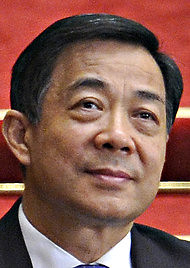
Communist Party of China former province leader Bo Xilai is subject to possible criminal charges related to the cover-up of the death of a British businessman. His wife was convicted., a photo by Pan-African News Wire File Photos on Flickr.
Bo Xilai's fate still uncertain after wife's trial
By Didi Tang, Associated Press
BEIJING (AP) — The official Chinese account of the murder trial of the wife of a disgraced top politician made clear that she will be convicted, but never mentioned her once-powerful husband, suggesting the Communist Party wants to distance him from the crime.
The extraordinarily long account by the official Xinhua News Agency said Gu Kailai and a household aide "confessed to intentional murder" in their trial Thursday in the death of British businessman Neil Heywood.
Gu's husband, Bo Xilai, was one of China's most powerful and charismatic politicians until he was ousted as Communist Party chief of Chongqing city as the scandal surrounding Heywood's death last November unfolded.
The scandal has badly shaken the country's leadership. Gu's tightly orchestrated trial is a step toward resolving the political turbulence before the country's once-a-decade leadership transition this fall, and officials are likely to want to prevent the case from further sullying the party's reputation.
Bo is in the hands of the party's internal discipline and inspection commission, which is expected to issue a statement about his infractions. That would open the way for a trial with charges possibly including obstructing police work and abuse of power. Thus far, Bo has only been accused of grievous but unspecified rules violations.
In its 3,400-word account of the case issued late Friday, Xinhua said four Chongqing police officers who had close relations with the family tried to cover up the murder. That statement could indirectly implicate Bo, Beijing lawyer Liu Xiaoyuan said.
"The questions are whether he knew about the murder and whether he obstructed the police investigation," Liu said.
The four policemen went on trial Friday. No further details have been released.
Another possible charge against Bo is corruption, Liu said, noting that Gu reportedly stated that Heywood had threatened the safety of her son over compensation for a failed land project.
Cheng Li, an expert in Chinese elite politics at the Brookings Institution in Washington, D.C., said Bo is likely to be accused of participating in a cover-up but authorities might play down the corruption allegation.
"The Xinhua report did not mention the (financial) amount. That's a deliberate attempt to focus on the murder and not on corruption," Li said.
It also did not mention Bo, 64, even though he is a major political figure in China. He was sacked as the Communist Party boss of Chongqing in March and later suspended from the party's 25-member Politburo, which is just below the nine-member Standing Committee in power.
Bo, the son of a Communist revolutionary veteran, was widely popular among working-class Chinese. But his maneuvering to reach the highest echelons of the Communist Party angered some leaders, as did his highly publicized campaigns to bust organized crime and promote Communist culture while trampling on civil liberties and reviving memories of the chaotic Cultural Revolution.
The court in Hefei in Anhui province that tried Gu said a verdict would be delivered later.
A guilty verdict is all but assured, with possible punishment ranging from 10 years in prison to a death sentence.
Xinhua said evidence showed Gu used cyanide to poison Heywood in a Chongqing hotel room but also described her as depressed and fearful that Heywood would harm her family — factors that may bring leniency in her sentence.
Xinhua said Gu accepted all the facts in the indictment and was ready to accept her punishment, saying, "the case has produced great losses to the party and the country, for which I ought to shoulder the responsibility."
Gu said Heywood wrote a letter of self-introduction in about 2005 when her son Bo Guagua was studying in Britain. They became involved in a land project that never got off the ground. According to Xinhua, she said Heywood later got into a dispute with her and her son over payment and other issues and she "believed Heywood had threatened the personal safety of her son, and decided to kill Heywood."
The report did not detail any alleged threats or say why the murder then took place seven years later when Bo Guagua was a graduate student at Harvard.
No comments:
Post a Comment